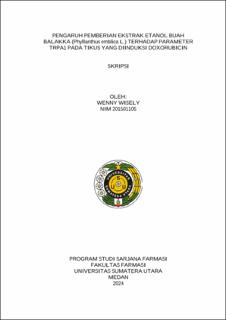Pengaruh Pemberian Ekstrak Etanol Buah Balakka (Phyllanthus emblica L.) terhadap Parameter TRPA1 pada Tikus yang Diinduksi Doxorubicin
Effect of Administering Fruit Ethanol Extract Balakka (Phyllanthus emblica L.) Against TRPA1 Parameter in Doxorubicin-Induced Mice

Date
2024Author
Wisely, Wenny
Advisor(s)
Syahputra, Rony Abdi
Harahap, Urip
Metadata
Show full item recordAbstract
Background: Hypertension is one of the diseases related to the cardiovascular system, the administration of doxorubicin allows hypertension to occur as ROS (Reactive Oxygen Species) increases, TPRA1 are receptors for blood pressure regulation, especially in the heart, which can be measured and related to antioxidants. Balakka fruit (Phyllanthus emblica L.) is a high source of antioxidants with a content of secondary metabolites consisting of alkaloids, saponins, flavonoids. Therefore, research is needed to determine the most effective dose.
Objective: To ascertain the impact of 100, 300, and 500 mg/kgBB of balaca fruit (Phyllanthus emblica L.) ethanol extract which function as antioxidants on TRPA1 parameters in doxorubicin-induced rats.
Research Method: Experimental research includes the manufacture of balaca fruit ethanol extract, phytochemical screening, extract strandarization, testing of the cardioprotective effect of balakka fruit, measurement of TRPA1 levels with ELISA Kit, and data processing.
Results: The results showed that of the 6 treatment groups, groups IV, V, and VI had lower levels of TRPA1 compared to group II, where the most effective decrease occurred in group VI (P ≤ 0.0001) in both variables, followed by Group V (P ≤ 0.001) and then group IV (P ≤ 0.01).
Conclusion: The administration of ethanol extract of Balakka fruit of rats induced by doxorubicin had an effect on the parameters of TRPA1, with the most effective dose given as much as 500 mg.
Collections
- Undergraduate Theses [1719]
